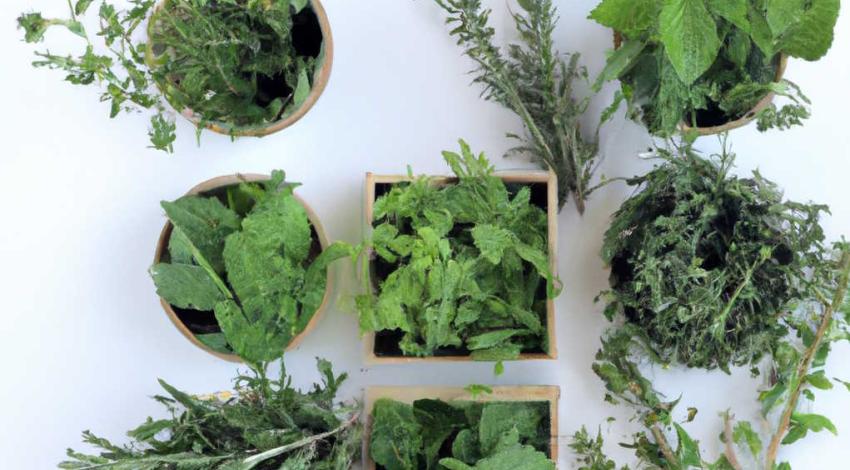Herbs : An Introduction
Herbs are essential to any kitchen and add flavour and aroma to dishes. They are beneficial in cooking because they can enhance the natural flavours of different types of food, including vegetables, white meat, red meat, and fish. The use of herbs in cooking dates back to ancient times, and they continue to play an important role in modern-day cuisine. This article discusses the different types of food and the herbs that complement them.
Vegetables:
When it comes to cooking vegetables, herbs can add a depth of flavour that takes them to the next level. Different herbs pair well with other vegetables, and the following are some examples:
- Basil: This herb has a sweet and slightly spicy flavour that complements tomatoes, bell peppers, and eggplants. It is commonly used in Italian cuisine and pairs well with pasta dishes.
- Thyme: This herb has a subtle, earthy flavour that works well with root vegetables such as potatoes, carrots, and parsnips. It is also a great addition to stuffing and roast chicken dishes.
- Rosemary: This herb has a spicy, pine-like flavour that pairs well with roasted vegetables such as carrots, potatoes, and beets. It is also commonly used in Mediterranean cuisine and works well with lamb dishes.
- Sage: This herb has a slightly bitter and earthy flavour that complements hearty vegetables such as mushrooms and squash. It is also a popular herb in stuffing and pairs well with pork dishes.
White Meat:
White meat, such as chicken and turkey, are relatively mild in flavour, which means they can benefit from adding herbs to enhance their taste. The following herbs are great for white meat:
- Parsley: This herb has a fresh, bright flavour that pairs well with chicken and fish. It is commonly used as a garnish and can also be used to flavour sauces and dressings.
- Tarragon: This herb has a slightly sweet and anise-like flavour that works well with chicken and turkey. It is commonly used in French cuisine and pairs well with creamy sauces.
- Sage: This herb's slightly bitter and earthy flavour complements chicken and turkey dishes. It is commonly used in stuffing and pairs well with pork dishes.
- Thyme: This herb has a subtle, earthy flavour that works well with chicken and turkey dishes. It is also a great addition to stuffing and roast chicken dishes.
Red Meat:
Red meat, such as beef and lamb, has a strong flavour, meaning that the herbs used to complement them must be equally bold. The following herbs are great for red meat:
- Rosemary: This herb has a spicy, pine-like flavour that pairs well with beef and lamb dishes. It is commonly used in Mediterranean cuisine and works well with roasted potatoes.
- Thyme: This herb has a subtle, earthy flavour that works well with beef and lamb dishes. It is also a great addition to stuffing and roasting lamb dishes.
- Oregano: This herb has a slightly bitter and spicy flavour that complements beef and lamb dishes. It is commonly used in Italian and Greek cuisine and pairs well with tomatoes and olives.
- Sage: This herb's slightly bitter and earthy flavour complements lamb dishes. It is commonly used in stuffing and pairs well with pork dishes.
Fish:
Fish has a delicate flavour, meaning the herbs used to complement it must be subtle. The following herbs are great for fish:
- Dill: This herb has a fresh, slightly sweet flavour that pairs well with salmon and other oily fish. It is commonly used in Scandinavian cuisine and works well with sour cream-based sauces.
- Parsley: This herb has a fresh, bright flavour that pairs well with white fish such as cod and halibut. It is commonly used as a garnish and can also be used to flavour sauces and dressings.
- Chives: This herb's mild onion-like flavour complements fish dishes. It is commonly used as a garnish and can also be used to flavour sauces and dips.
- Lemon Balm: This herb has a citrusy, slightly sweet flavour that pairs well with fish dishes. It is commonly used in Mediterranean cuisine and works well with grilled fish.
In summary, herbs are versatile and essential ingredients in cooking. Different herbs pair well with different types of food, and their use can elevate the taste and aroma of a dish. When cooking with herbs, it is crucial to consider the flavours of the food and the intensity of the herbs used to complement them. You can create unique and delicious dishes that impress you by experimenting with different herbs and combinations.
Some key takeaways from this article include:
- Basil pairs well with tomatoes, bell peppers, and eggplants.
- Thyme works well with root vegetables, roast chicken, and lamb dishes.
- Rosemary complements roasted vegetables, beef, and lamb dishes.
- Sage is an excellent addition to stuffing and pairs well with pork, chicken, and lamb dishes.
- Commonly used as a garnish, Parsley pairs well with chicken and fish.
- Tarragon works well with chicken, turkey, and creamy sauces.
- Oregano is widely used in Italian and Greek cuisine and complements beef and lamb dishes.
- Dill pairs well with salmon and oily fish.
- Widely used as a garnish, Chives complement fish dishes.
- Finally, the lemon balm works well with grilled fish and has a citrusy, slightly sweet flavour.

